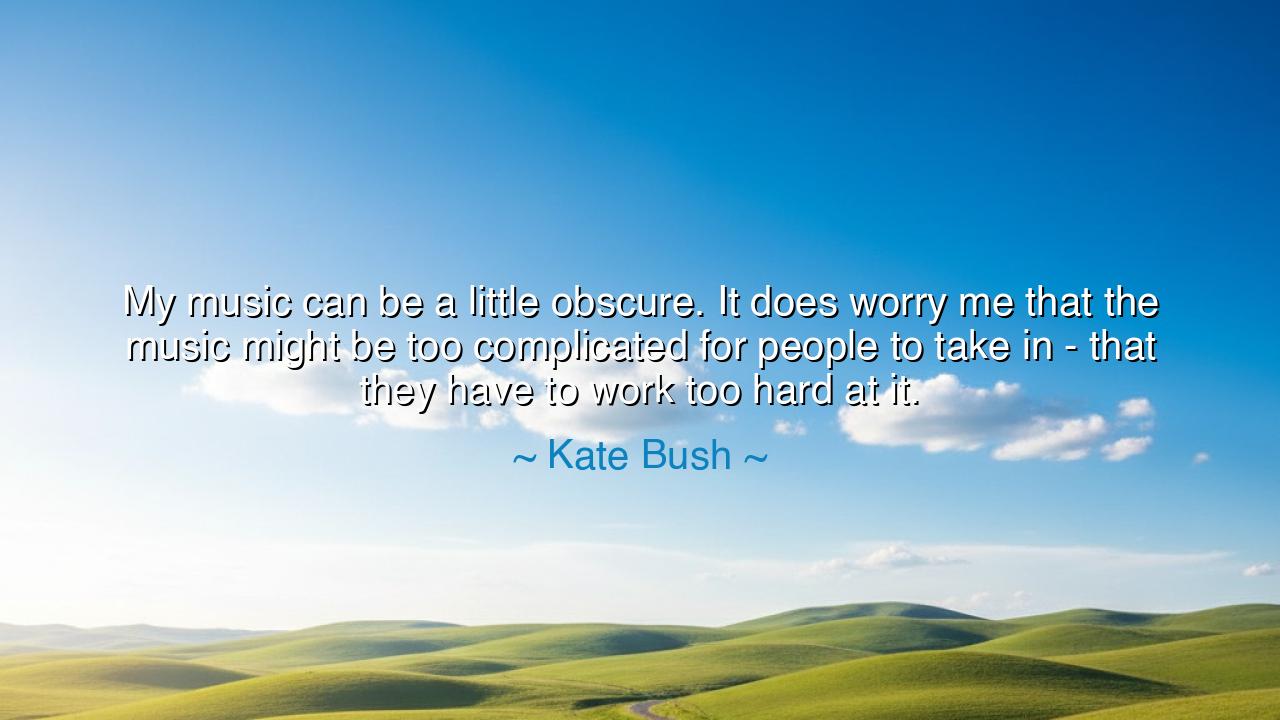
My music can be a little obscure. It does worry me that the
My music can be a little obscure. It does worry me that the music might be too complicated for people to take in - that they have to work too hard at it.






“My music can be a little obscure. It does worry me that the music might be too complicated for people to take in—that they have to work too hard at it.” Thus spoke Kate Bush, a voice both ethereal and fierce, a weaver of sounds that defy convention. Her words are not the boast of a proud creator, but the confession of an artist caught between vision and audience, between the wild freedom of expression and the yearning to be understood. In them we hear the eternal struggle of the true creator: to remain faithful to the depth of one’s art, while fearing that its depth may alienate those who come to drink from it.
The origin of this truth lies in the nature of art itself. That which is simple and sweet may be easily received, but the art that ventures into mystery demands more of its audience. Bush admits her music is sometimes “obscure,” not because it lacks meaning, but because it carries many layers of meaning. It is woven with symbolism, poetry, and soundscapes that cannot be consumed in haste. Her worry reflects a compassion for her listeners, for she longs not to confuse them, but to invite them into a world where beauty and complexity are one.
History offers echoes of this same struggle. Consider the life of Emily Dickinson, who wrote poems so strange to her contemporaries that many dismissed them. She broke the rules of rhythm, punctuation, and form, yet within her work lay galaxies of meaning. For decades, her poems were misunderstood, yet now they are revered as some of the deepest treasures of English literature. Like Kate Bush, she bore the fear that her vision was “too complicated,” yet time proved that what demands labor from the reader often yields the richest reward.
So too with Ludwig van Beethoven, who, as he pushed music into new frontiers, was often accused of being too obscure, too chaotic, too difficult. Many of his later works were incomprehensible to his peers, who claimed he had lost the clarity of his earlier style. Yet in truth, he was writing not for his age but for the ages. Now those very works—once deemed too difficult—are revered as revelations of genius. This is the paradox Kate Bush names: that the obscurity of today may become the clarity of tomorrow, if the soul dares to linger and listen.
Yet her words carry a profound humility. She is not exalting obscurity for its own sake, nor is she claiming superiority. She worries that her art may demand too much labor from her listeners. This reveals the heart of a true artist: one who loves her audience, who desires not to alienate but to connect. The tension she names is the tension of love itself: to remain faithful to one’s truth, but to yearn also for communion with others. In this, Bush becomes not just an artist, but a mirror of the human soul itself, which longs always to be both unique and understood.
The lesson for us is clear: when faced with the fear of being misunderstood, do not abandon your depth. If your work, your words, your life are complex, let them be so. Trust that those who are meant to understand will take the time to labor, and in that labor they will find treasure. But also carry the humility of Kate Bush—be mindful of others, seek connection where you can, and never wield obscurity as a weapon. Clarity and mystery must walk hand in hand.
Therefore, let each person act with courage. Create honestly, even if your truth is difficult to digest. Do not dilute your vision for the sake of easy applause, but also do not scorn those who struggle to understand. Invite them, as Bush does, into the depths with compassion. For life itself is obscure, and those who dare to engage with its complexity become richer, wiser, and more human.
So let Kate Bush’s words remain as a guiding star: “My music can be a little obscure… they have to work too hard at it.” Take them as reminder that true art, true thought, and true living are not always easy, but they are always worth the effort. For what is obscure today may be the doorway to revelation tomorrow, if we only have the courage to enter.






AAdministratorAdministrator
Welcome, honored guests. Please leave a comment, we will respond soon